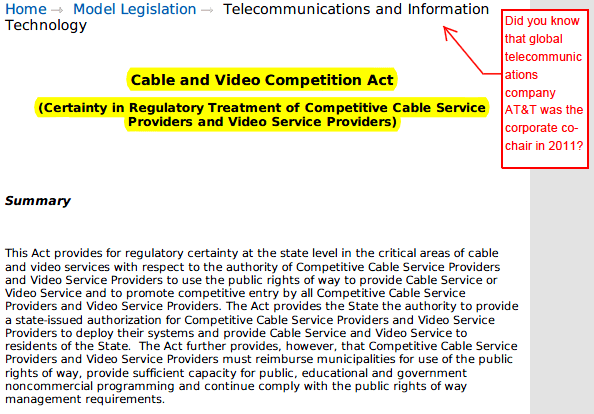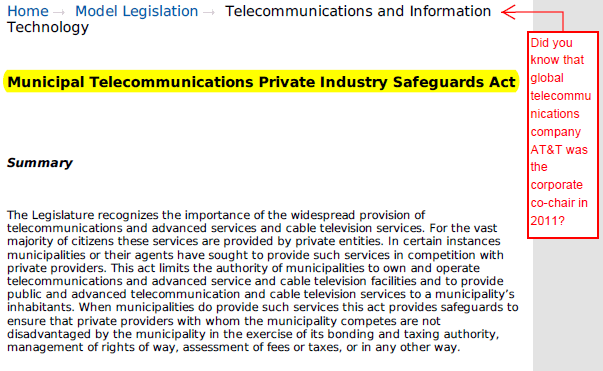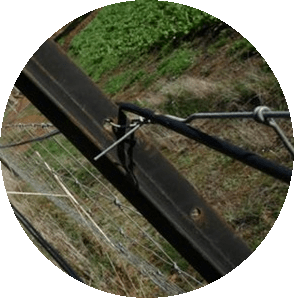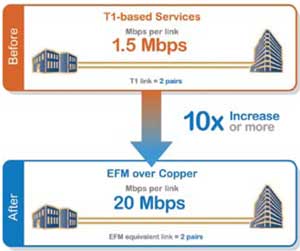 [Stop the Cap! has written extensively about the pervasive influence some of the nation’s largest cable and phone companies have on telecommunications legislation in this country. On the state level, one group above all others is responsible for quietly getting company-ghost-written bills and resolutions into the hands of state lawmakers to introduce as their own.]
[Stop the Cap! has written extensively about the pervasive influence some of the nation’s largest cable and phone companies have on telecommunications legislation in this country. On the state level, one group above all others is responsible for quietly getting company-ghost-written bills and resolutions into the hands of state lawmakers to introduce as their own.]
The American Legislative Exchange Council (ALEC) is the latest corporate response to campaign finance and lobbying reform — a Washington, D.C.-based “middle man” that brings lawmakers and corporate interests together while obfuscating the obvious conflict of interest to voters back home if they realized what was going on.
ALEC focuses on state laws its corporate members detest because, in many cases, they represent the only regulatory obstacles left after more than two decades of deregulatory fervor on the federal level. State lawmakers are ALEC’s targets — officeholders unaccustomed to a multi-million dollar influence operation. The group invites lawmakers to participate in policy sessions that equally balance corporate executives on one side with elected officials on the other. Consumers are not invited to participate.
ALEC’s telecom members have several agendas on the state level, mostly repealing:
- Local franchising and oversight of cable television service;
- Statewide oversight of the quality of service and measuring the reliability of phone and cable operators;
- Consumer protection laws, including those that offer customers a third party contact for unresolved service problems;
- Universal service requirements that insist all customers in a geographic region be permitted to receive service;
- Funding support for public, educational, and government access television channels;
- Rules governing the eventual termination of essential service for non/past due payments;
- Local zoning requirements and licensing of outside work.
But ALEC is not always focused on deregulation or “smaller government.” In fact, many of its clients want new legislation that is designed to protect their position of incumbency or enhance profits. Cable and phone company-written bills that restrict or ban public broadband networks are introduced to lawmakers through ALEC-sponsored events. In several cases, model legislation that was developed by cable and phone companies was used as a template for nearly-identical bills introduced in several states without disclosing who actually authored the original bill.
 ALEC specializes in secrecy, rarely granting interviews or talking about the corporations that pay tens of thousands of dollars to belong. Corporate members also enjoy full veto rights over any proposal or idea not to their liking, and aborted resolutions or legislative proposals are kept completely confidential. More often than not, however, legislators and corporate members come to an agreement on something, and the end product ends up in a central database of model bills and resolutions ready to be introduced in any of 50 state legislatures.
ALEC specializes in secrecy, rarely granting interviews or talking about the corporations that pay tens of thousands of dollars to belong. Corporate members also enjoy full veto rights over any proposal or idea not to their liking, and aborted resolutions or legislative proposals are kept completely confidential. More often than not, however, legislators and corporate members come to an agreement on something, and the end product ends up in a central database of model bills and resolutions ready to be introduced in any of 50 state legislatures.
Many do, and often these proposed bills are remarkably similar, if not identical. That proved to be no coincidence. In July 2011, the Center for Media and Democracy was able to obtain a complete copy of ALEC’s master database of proposed legislation. The Center called it a stark example of “corporate collaboration reshaping our democracy, state by state.”
National Public Radio takes an inside look at the American Legislative Exchange Council and how it works to help major corporations influence and change state laws. (October 29, 2010) (8 minutes)
You must remain on this page to hear the clip, or you can download the clip and listen later.
ALEC’s Corporate Telecom Members
 ALEC defends itself saying it does not directly lobby any legislator. That is, in fact true. But many of its corporate members clearly do. AT&T is one of ALEC’s most high profile members, serving as a “Private Enterprise Board” member, state corporate co-chair of Arkansas, California, Connecticut, Louisiana, Mississippi, and Texas (all AT&T service areas), a member of the Telecommunications and Information Technology Task force, and “Chairman” level sponsor of the 2011 ALEC Annual Conference (a privilege for those contributing $50,000).
ALEC defends itself saying it does not directly lobby any legislator. That is, in fact true. But many of its corporate members clearly do. AT&T is one of ALEC’s most high profile members, serving as a “Private Enterprise Board” member, state corporate co-chair of Arkansas, California, Connecticut, Louisiana, Mississippi, and Texas (all AT&T service areas), a member of the Telecommunications and Information Technology Task force, and “Chairman” level sponsor of the 2011 ALEC Annual Conference (a privilege for those contributing $50,000).
AT&T’s lobbying is legendary, and is backed with enormous campaign contributions to legislators on the state and federal level.
![]() But AT&T isn’t the only telecommunications company that belongs to or supports ALEC:
But AT&T isn’t the only telecommunications company that belongs to or supports ALEC:
- CenturyLink (also including Qwest Communications), “Director” level sponsor of 2011 ALEC Annual Conference ($10,000 in 2010)
- Cincinnati Bell
 Comcast, State corporate co-chair of Georgia, Minnesota, Missouri and Utah and recipient of ALEC’s 2011 State Chair of the Year Award
Comcast, State corporate co-chair of Georgia, Minnesota, Missouri and Utah and recipient of ALEC’s 2011 State Chair of the Year Award- Cox Communications, “Trustee” level sponsor of 2011 ALEC Annual Conference ($5,000 in 2010)
- Time Warner Cable, State corporate co-chair of Ohio, “Director” level sponsor of 2011 ALEC Annual Conference ($10,000 in 2010)
- Verizon Communications, Private Enterprise Board member and State corporate co-chair of Virginia and Wyoming
ALEC supporters  among trade groups and astroturf/corporate-influenced “non profits”:
among trade groups and astroturf/corporate-influenced “non profits”:
- National Cable and Telecommunications Association, ALEC Telecommunications and Information Technology Task Force member
- Free State Foundation (think tank promoting limited government and rule of law principles in telecommunications and information technology policy)
- Heartland Institute, Exhibitor at ALEC’s 2011 Annual Conference, Telecommunications and Information Technology Task Force member, Education Task Force member, Commerce, Insurance and Economic Development Task Force, Financial Services Subcommittee member and Energy, Environment and Agriculture Task Force member
ALEC’s Ready-to-Introduce Legislation
The two most pervasive pieces of legislation ALEC’s telecom members (especially AT&T) want as a part of state law are bills to strip local authority over cable systems and hand it to the state government and the elimination or excessive micromanagement of community broadband networks:

This model bill for increased cable competition strips most of the authority your community has over cable television operations and transfers it to under-funded or less aggressive state bodies. Although the bill claims to protect local oversight and community access stations, the statewide video franchise fee almost always destroys the funding model for public, educational, and government access channels.

These municipal broadband bills are always written to suggest community and private players must share a "level playing field." But bills like these always exempt the companies that actually wrote the bill, and micromanage and limit the business operations of the community provider.

Legislators: Bring the family to Mardi Gras World on us, sponsored by America's largest telecommunications companies.
WHYY Philadelphia’s ‘Fresh Air’ spent a half hour exploring who really writes the legislation introduced in state legislatures. When ALEC gets involved, The Nation reporter John Nichols thinks the agenda is clear: “All of those pieces of legislation and those resolutions really err toward a goal, and that goal is the advancement of an agenda that seems to be dictated at almost every turn by multinational corporations.” (July 21, 2011) (32 minutes)
You must remain on this page to hear the clip, or you can download the clip and listen later.
Unfortunately, state lawmakers are not always sophisticated enough to recognize a carefully crafted legislative agenda at work. National Public Radio found one excellent example — the 2010 Arizona immigration law that requires police to arrest anyone who cannot prove they entered the country legally when asked. America’s immigration problems remain a major topic on the agenda at some ALEC events, curious for a corporate-backed group until you realize one of ALEC’s members — the Corrections Corporation of America — America’s largest private prison operator, stood to earn millions providing incarceration services for what some estimated could be tens, if not hundreds of thousands of new prisoners being held on suspicion of immigration violations.
CCA was in the room when the model immigration legislation, eventually adopted by Arizona’s legislature, was written at an ALEC conference in 2009.
Bring the Kids, Stay for the Corporate Influence
Getting legislators to attend these seminars isn’t as hard as it might sound.
In January, we reported members of the North Carolina General Assembly, who showed their willingness to support telecom industry-written bills when it passed an anti-community broadband initiative in 2011, were wined and dined (along with their staff) by ALEC at the Mardi Gras World celebration in New Orleans. Rep. Marilyn Avila (R-Time Warner Cable), who introduced the aforementioned measure, brought her husband to Asheville to enjoy a special weekend as the featured guest speaker at a dinner sponsored by North Carolina’s state cable lobbying group:
The North Carolina Cable Telecommunications Association reported they not only picked up Marilyn’s food and bar bill ($290 for the Aug. 6-8 event), they also covered her husband Alex, too. Alex either ate and drank less than Marilyn, or chose cheaper items from the menu, because his food tab came to just $185.50. The cable lobby also picked up the Avila’s $471 hotel bill, and handed Alex another $99 in walking-around money to go and entertain himself during the weekend event. The total bill, effectively covered by the state’s cable subscribers: $1,045.50.

Rep. Avila with Marc Trathen, Time Warner Cable's top lobbyist (right) Photo by: Bob Sepe of Action Audits
ALEC makes it easy because it pays the way for lawmakers and families to attend their events through the award of “scholarships”:
The organization encourages state lawmakers to bring their families. Corporations sponsor golf tournaments on the side and throw parties at night, according to interviews and records obtained by NPR.
[…] Videos and photos from one recent ALEC conference show banquets, open bar parties and baseball games — all hosted by corporations. Tax records show the group spent $138,000 to keep legislators’ children entertained for the week.
But the legislators don’t have to declare these as corporate gifts.
Consider this: If a corporation hosts a party or baseball game and legislators attend, most states require the lawmakers to say where they went and who paid. In this case though, legislators can just say they went to ALEC’s conference. They don’t have to declare which corporations sponsored these events.
Reporter John Nichols told NPR ALEC’s focus on state politics is smart:
“We live at the local and state level. That’s where human beings come into contact more often than not,” he says. “We live today in a country where there’s a Washington obsession, particularly by the media but also by the political class. … And yet, in most areas, it’s not Washington that dictates the outlines, the parameters of our life. … And so if you come in at the state government level, you have a much greater ability to define how you’re going to operate.”
Resources:
- ALEC Exposed: Access a database of more than 800 corporate ghost-written bills and resolutions intended to become state law in all 50 states. Sponsored by the Center for Media and Democracy.
- ALEC’s Database Revealed: A more general indictment of ALEC and its coordinated agenda to allow corporate influence to hold an increasing role in public policy.
- Protestors Demand End to Verizon’s Involvement in ALEC: In Albany, N.Y., protestors turned up in front of Verizon demanding the company end its association with ALEC.
- California Lawmakers Enjoy Free Trips to Hawaii, Europe: California’s state politicians are under fire for lavish travel arranged by ALEC.


 Subscribe
Subscribe






